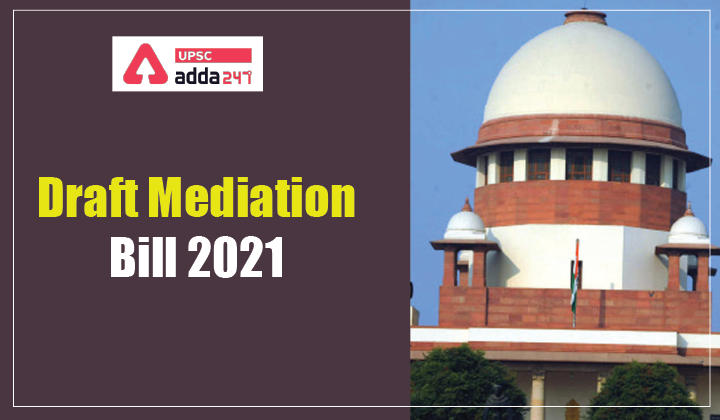Table of Contents
Draft Mediation Bill 2021: Relevance
- GS 3: Structure, organization and functioning of the Executive and the Judiciary—Ministries and Departments of the Government; pressure groups and formal/informal associations and their role in the Polity.
Have you cleared UPSC CSE Prelims 2021? Register Here for Free Study Material
Draft Mediation Bill 2021: Context
- Recently, Ministry of Law and Justice has released draft Bill of country’s first mediation law—Draft Mediation Bill 2021.
Draft Mediation Bill 2021: Key points
- The Bill takes into contemplation the international practice of using the terms ‘conciliation’ and ‘mediation’ interchangeably.
- Further, it has also become expedient to enact a law in mediation on issues of domestic and international mediation as India is a signatory to the Singapore Convention on Mediation.
- The bill aims to promote, encourage and facilitate mediation in the country, particularly institutional mediation.
Draft Mediation Bill 2021: Key features
- The draft Bill proposes for pre-litigation mediation and at the same time safeguards the interest of the litigants to approach the competent adjudicatory forums/courts in case an urgent relief is sought.
- The successful outcome of mediation in the form of Mediation Settlement Agreement (MSA) has been made enforceable by law. Since the Mediation Settlement Agreement is out of the consensual agreement between the parties, the challenge to the same has been permitted on limited grounds.
- The mediation process protects the confidentiality of the mediation undertaken and provides for immunity in certain cases against its disclosure.
- The registration of Mediation Settlement Agreement has also been provided for with State/District/Taluk Legal Authorities within 90 days to ensure maintenance of authenticated records of the settlement so arrived.
- Provides for establishment of the Mediation Council of India.
- Provides for community mediation.
Alternate Dispute Resolution mechanisms
- Arbitration, Mediation and Conciliation are the three Alternative Dispute Resolution (ADR) methods.
Arbitration
- Arbitration is like a court procedure as the parties submit evidence alike a trial where a third party hear the entire situation and give his/her decision, which is binding upon the parties.
- Arbitration can be done through voluntary or compulsory method.
- Voluntary arbitration: When a dispute arises between the two parties, and they are unable to resolve their differences by themselves, the parties agree to present their dispute to the fair authority and the decision will be binding upon both parties.
- Compulsory arbitration: It is a method where the parties are required to accept arbitration without any willingness on their part.
- When one party in any industrial dispute feels aggrieved by the act of the other party, it may approach the appropriate government to refer the dispute to any organization of adjudication for the settlement.
Mediation
- Mediation is one of the alternative dispute resolutions which is voluntary and informal process for resolution of disputes.
- Mediation is a process which is under the control of the parties.
- The mediator acts as a middle person who assists to come on a negotiated point of their dispute.
Conciliation
- A conciliator is a third party who is involved in settling the dispute of the parties.
- Generally, there is one conciliator for the settlement but there can be more than one conciliator, if the parties have requested for the same.
- If there is more than one conciliator then they will act jointly in the matter.




 TSPSC Group 1 Question Paper 2024, Downl...
TSPSC Group 1 Question Paper 2024, Downl...
 TSPSC Group 1 Answer key 2024 Out, Downl...
TSPSC Group 1 Answer key 2024 Out, Downl...
 Cabinet Ministers of India 2024, New Cab...
Cabinet Ministers of India 2024, New Cab...







